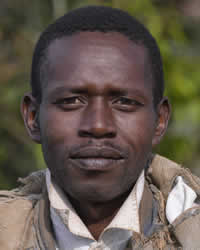Dizi in Ethiopia

Photo Source:
Rod Waddington - Flickr
Creative Commons
|
Send Joshua Project a map of this people group.
|
| People Name: | Dizi |
| Country: | Ethiopia |
| 10/40 Window: | Yes |
| Population: | 70,000 |
| World Population: | 70,000 |
| Primary Language: | Dizin |
| Primary Religion: | Ethnic Religions |
| Christian Adherents: | 20.00 % |
| Evangelicals: | 14.46 % |
| Scripture: | New Testament |
| Ministry Resources: | Yes |
| Jesus Film: | No |
| Audio Recordings: | Yes |
| People Cluster: | Omotic |
| Affinity Bloc: | Horn of Africa Peoples |
| Progress Level: |
|
Introduction / History
According to the oral tradition of the Dizi people Orthodox Christian missionaries from Tigre came to the Dizi area several hundred years ago. They taught and preached for a few years, and when they left, they gave three things to the Maji Chief and the Adikas Chief that those chiefs considered sacred: a blue cloth, a block of wood, and a fly switch. These artifacts are still being kept in those chiefs' compounds in small, carefully maintained buildings.
The Dizi speak Dizin which is a member of the Omotic language family, which has generally been considered a member of the Afro-Asiatic language family.
Where Are they Located?
The Dizi people live in southwestern Ethiopia, west of the Omo River. The town of Maji, which is near the center of the Dizi area, is about 100 kilometers (62 miles) directly south of the town of Mizan Teferi. Driving from Mizan Teferi to Maji on the road through Dima is about a 170 kilometer (106 mile) journey. The Dizi's closest neighbors are the Me'en people to the north, and the Suri to the south and west. Their languages are both part of the Surmic branch of Nilo-Saharan, unlike Dizin, which is Omotic. Maji is the largest town in the Dizi area. The three next most populous towns are Jeba, Tum, and Adikas, in that order.
What Are Their Lives Like?
Most Dizi are subsistence farmers who grow enset (false banana), corn, barley, teff, and other crops. They have cattle, sheep and chickens, and they are beekeepers for the honey.
One report says "The Dizi were a very, very class structured society even to the point that you needed to know by relationship exactly how far up the hand - what knuckle - you took hold of when you shook hands with another man." The traditional leaders maintained order before the current structures of the Ethiopian government came to the area. Subsistence farming was (and continues to be) the most common livelihood for the Dizi. Metal workers were likely invited from outside the area by the Dizi leaders to refine iron ore and make tools of high tensile steel.
What Are Their Beliefs?
Most Dizi are Animists. Christianity (Ethiopian Orthodox and Evangelical) has influence also.
What Are Their Needs?
Many still live in fear of evil spirits. Violence from a neighboring people group continues to be a very common occurence. Some medical care is available in the area, but travel to hospitals in other areas is often needed if someone has major health problems. A traditional thick fermented drink made from grain, is consumed for food, even by children, which sometimes results in alchoholism.
Prayer Points
Pray for more solid Christian leaders in the churches.
Pray that the people would be open to the message the evangelists bring.